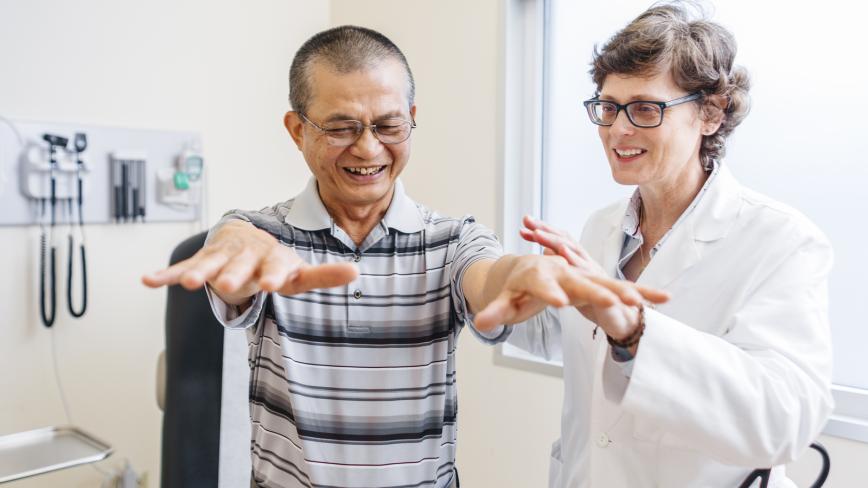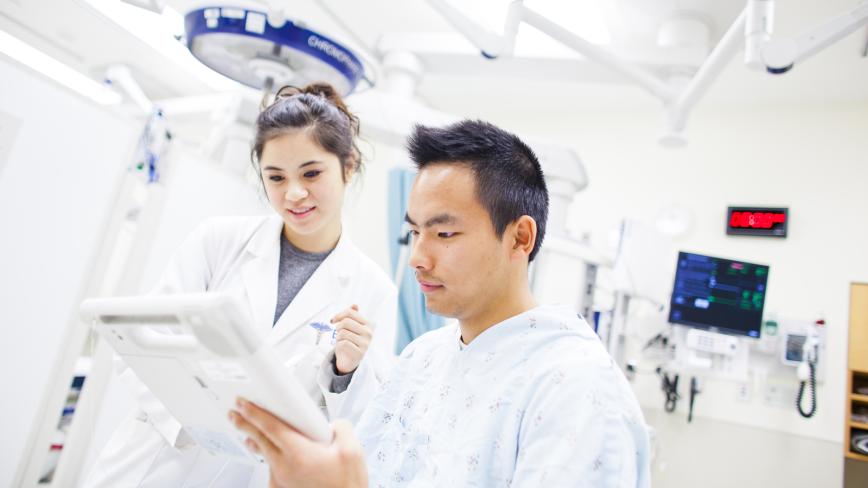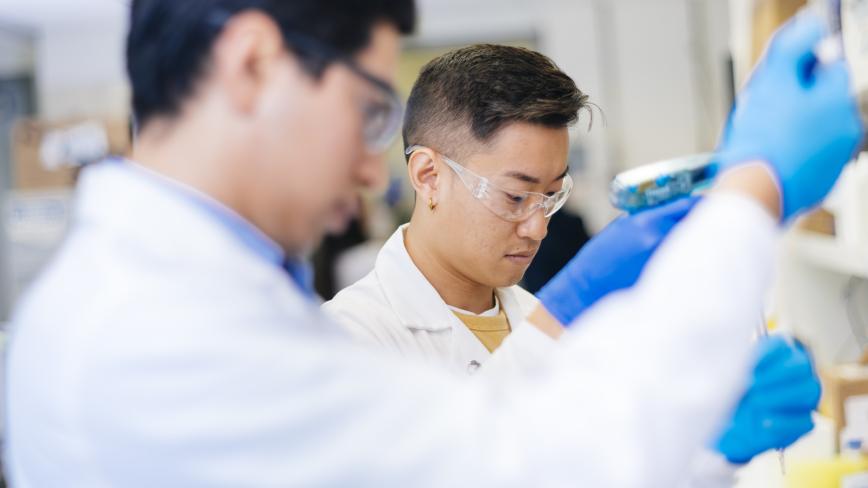Ryan Manriquez, a UC Berkeley graduate student and UC Davis alum, personally knows the life-saving power of clinical trials.
He was born with a life-threatening, rare neuromuscular disease, Spinal Muscular Atrophy type-2, that leads to progressive muscle weakness and difficulty swallowing and breathing. When he was born, his family was told he had a life expectancy of 28 years.
But a groundbreaking clinical trial in 2016 changed all that. Spinraza, a treatment made possible in large part by the National Institutes of Health (NIH) and beginning as a clinical trial, completely stopped the progression of the neuromuscular disease.
Now 24 and the president of the UC Graduate and Professional Council, Ryan credits this clinical trial with helping him live a full life.
NIH’s CTSA program – bringing discoveries out of the lab and into health settings
Clinical trials are a critical example of how UC campuses with Clinical and Translational Science Awards (CTSAs) from NIH bridge the gap between laboratory discoveries and real-world medical applications.
Through the NIH CTSA program, more than 60 medical institutions nationwide focus on translating scientific research into medical treatments and clinical practices that improve patient care and broader public health. At UC, the campuses that are CTSA awardee institutions are typically referred to as Clinical and Translational Science Institutes (CTSIs) or centers.
The University of California is home to five CTSIs. Located at UC Davis, UC Irvine, UCLA, UC San Diego and UCSF, each UC CTSI offers clinical and translational research that has led to scientific discoveries and medical breakthroughs – benefitting patients in the clinic, hospital and broader community.
The five UC CTSIs work with a broad array of community, state and national partners to translate medical breakthroughs into real-world health solutions, including:
- California Department of Public Health (CDPH)
- Celebrate Life Cancer Ministry
- Children’s Hospital of Orange County (CHOC)
- Ethel Hart Senior Center
- Los Angeles County Department of Public Health
- Los Angeles Unified School District
- OC Health Care Agency (OCHCA)
- Rady Children’s Hospital (RCH)
- Sacramento Food Bank and Family Services
- Sickle Cell Care Coordination
- Sanford Stem Cell Institute
- Turning Point Community Programs
- Veteran’s Administration (VA)
- Walgreens
- YMCA
"A critical aspect of clinical and translational research is the power of partnerships. From local collaborations with community institutions to broader partnerships across state and national networks, working together is key to addressing our complex health care challenges," shared Dan Cooper, M.D., founding director of the UC Irvine Institute for Clinical & Translational Science and distinguished professor, Department of Pediatrics, UCI School of Medicine.
"At UC Irvine, we understand the importance of tackling these issues together. That's why we have forged valuable partnerships with organizations like Children’s Hospital of Orange County, the Tibor Rubin VA Medical Center and the Orange County Health Care Agency, as well as collaborating with the other CTSA awardee institutions across the University of California. These partnerships allow us to ensure that our research is innovative, inclusive and making a real impact on the communities we serve."
The impact of UC CTSIs is widely felt.
In Watts, a neighborhood in South Los Angeles, the Watts Rising Collaborative has secured $70 million to fund 25 community improvement projects. The UCLA Clinical and Translational Science Institute provides the research resources and services to assess the impact of these projects on physical, mental and social health outcomes.
As Ryan experienced, clinical trials can lead to life-changing care
Clinical trials form the bedrock of new health care treatments and are intended to evaluate whether a new drug or medical device is safe and effective. And there are several phases of a trial.
Through the collective power of the UC system and the stewardship of UC BRAID, all five UC CTSIs collaborate and share data to facilitate new treatments, medications and technologies to help improve patient care. Formed in 2010 by the five UC CTSIs, the UC BRAID (Biomedical Research Acceleration, Integration & Development) consortium aims to accelerate research and improve health through collaboration and resource sharing across the UC system.
These relationships help connect researchers and patients to UC’s nearly 5,000 clinical trials, covering more than 2,400 conditions, including lung cancer, diabetes, melanoma, COVID-19 and more.
For example, the CTSI at UCSF supports more than 200 clinical studies a year with 4,100 participants that advance therapies for a wide range of conditions in children and adults including novel, cutting-edge treatments such as:
- A clinical trial of a drug called teplizumab that is the first to delay disease progression in people with type 1 diabetes.
- A series of trials that led to FDA approval of palovarotene, the only FDA-approved treatment for fibrodysplasia ossificans progressiva, a debilitating disease of severe bone malformations in children.
- A clinical trial of a new treatment for adults with advanced glioblastoma, a type of brain cancer, that injects microbubbles across the blood-brain barrier with pulsed-ultrasound sonication placed against a surgically implanted device in the skull.
The research of UC CTSIs improves the health of rural communities
Researchers and health leaders at the UC CTSIs tackle a range of issues, including access to health care and other challenges faced by rural communities. Through active clinical trials, UC CTSIs are currently addressing areas like telehealth, chronic conditions, health care for veterans and asthma.
To help patients overcome the barriers to health care access in rural areas of California, UC CTSIs are leading innovative studies that leverage telehealth to improve access to care.
Currently, UC CTSIs are conducting telehealth clinical trials to explore ways to support parents of children with autism, help low-income patients manage chronic conditions like diabetes and hypertension, and identify treatment options for older veterans with brain injuries through collaboration with Veterans Affairs and military treatment facilities.
The work of UC CTSIs benefits patients across the nation
UC CTSI campuses are also a critical part of an expansive national network offering clinical trials, serving as critical clinical trial sites and leaders of clinical trial studies.
The site of a clinical trial refers to the specific facility or setting where the trial is conducted. This could be a hospital, medical center, research institution or private clinic where participants are enrolled and the study's procedures, assessments and interventions are carried out. There are often multiple sites for the same trial.
For instance, in a current nationwide asthma clinical trial, UC CTSI locations comprise four (14%) of the 29 trial sites, joining teams in states like Arizona and Florida in identifying treatments for severe asthma.
The five UC CTSIs are leading thousands of clinical trials, with sites all over the country. Currently, UC CTSIs are conducting hundreds of active cancer-related clinical trials in nearly every state of the country, almost all of which also rely on NIH funding. For example, people in states such as Florida, Missouri, North Carolina, Ohio, Pennsylvania and Texas benefit from UC-led cancer-related clinical trials. More than 200 hospitals, clinics and research institutions in these states are actively conducting cancer-related clinical trials through partnerships with UC CTSIs.
These include clinical trials for cancers like prostate cancer – the second-leading cause of cancer among men in the United States, with 1 in every 8 men being diagnosed with prostate cancer during their lifetime. Numerous active clinical trials are occurring right now in states like Ohio and Pennsylvania and are providing treatments to patients with metastatic prostate cancer. The work of the UC CTSIs is greatly helping patients, and the funding for UC CTSIs helps save lives and improve the health of hundreds of thousands of Americans.
UC-led clinical trials are a lifeline
From prostate cancer to asthma to Spinal Muscular Atrophy, clinical trials offer more than just research—they represent hope, a lifeline for those facing life-threatening conditions.
These trials are a cornerstone of clinical and translational science, where groundbreaking discoveries are turned into life-changing treatments.
The UC CTSIs, alongside the communities they serve—from California to Florida, Texas to Michigan, and countless locations in between—are pivotal in transforming scientific breakthroughs into tangible solutions. By connecting patients with cutting-edge therapies and pioneering research, these institutes are not only advancing medicine but are also providing critical access to life-saving care, offering a brighter future for individuals across the nation.
About University of California Health
University of California Health comprises six academic health centers, 21 health professional schools, a Global Health Institute and systemwide services that improve the health of patients and the University’s students, faculty and employees. All of UC’s hospitals are ranked among the best in California and its medical schools and health professional schools are nationally ranked in their respective areas.



